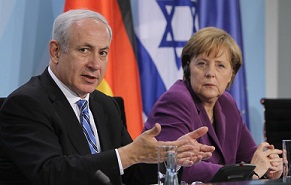“You apply this whole set of pressures – for what? For practically nothing”
The world powers are so keen on an agreement with Iran that they lowered their demands to the point that Tehran could agree to the demands and still build a bomb, Israeli Prime Minister Binyamin Netanyahu said in an interview with Germany’s Bild newspaper.
In a transcript of the interview published in the tabloid Tuesday and Wednesday, the prime minister said the demands that the P5+1 – the US, China, Russia, France, Britain and Germany – placed on Iran during the recent negotiations were woefully inadequate.
“You apply this whole set of pressures – for what? For practically nothing,” he said of the sanctions imposed on the Islamic Republic, in some of his harshest comments to date about the current round of negotiations between Iran and the P5+1.
“Iran could stop the 20-percent [uranium] enrichment at any moment now and not in any way retard their advance in the nuclear program,” he said. “The P5+1 is so keen on getting any agreement that they have lowered the demands.”
He reiterated his stand on what the demands should be: halting all uranium enrichment, removing all enriched material from the country and dismantling the underground facility at Qom, reported the Jerusalem Post.
Netanyahu bewailed that despite all the international pressure, “the Iranian nuclear program has not slowed down by one millimeter.”
He explained how a nuclear bomb works, saying it is filled with explosive material – “called fissile material” – prepared from uranium enriched at a low percentage.
“Iran has that already,” he said, pointing out that the process of filling the bomb becomes much faster when the uranium is enriched to a higher percentage.
“What they are being asked now to do is not stop filling the canister, not to stop enrichment, not to take away the material,” he continued. “The Iranians were only asked to stop 20% enrichment of uranium. That doesn’t stop their nuclear program in any way.”
According to Netanyahu, if Iran genuinely wanted nuclear power for peaceful purposes, it would agree to halt 20% enrichment.
“The reasons they don’t agree is that they are pursuing atomic bombs,” he said.
He stressed that the problem in Iran was not President Mahmoud Ahmadinejad, but “his boss, Ayatollah [Ali] Khamenei. It is important to understand that Khamenei runs Iran,” adding “his commitment to the eradication of Israel is no less ideological, messianic and apocalyptic than Ahmadinejad’s; in many ways, I suspect it is even more.”
Beyond the nuclear issue, the prime minister claimed Iran was providing Syrian President Bashar Assad with both the arms and personnel to “butcher” his people.
“I think what is happening in Syria is awful, it is wholesale murder,” Netanyahu said. “And you have to understand who is supporting this brutality, this butchery – it is Iran and Hezbollah. I mean supporting them physically. Killers supporting killers, giving them weapons, personnel to actually do the killing.”
Netanyahu was careful not to answer directly whether he thought the West should intervene militarily. “That’s a decision for the leading powers who are now talking about it. The less I say as prime minister of Israel, the better. The more I speak about it, I will be causing damage to the people we want to help,” he said.
 He praised German Chancellor Angela Merkel’s commitment to ‘Israel’s security’ and said that “the recent sale of another German submarine, an important adjunct to our national security,” exemplified that commitment. Although he did not refer to a Der Spiegel report this week saying that Israel had equipped German-supplied submarines with nuclear warheads that would give the Zionist entity a second-strike capability, Netanyahu said the German submarines were “very important” for 'Israel’s security'.
He praised German Chancellor Angela Merkel’s commitment to ‘Israel’s security’ and said that “the recent sale of another German submarine, an important adjunct to our national security,” exemplified that commitment. Although he did not refer to a Der Spiegel report this week saying that Israel had equipped German-supplied submarines with nuclear warheads that would give the Zionist entity a second-strike capability, Netanyahu said the German submarines were “very important” for 'Israel’s security'.
Germany has already supplied the occupying entity with three Dolphin- class submarines, with another three scheduled for delivery by 2017.